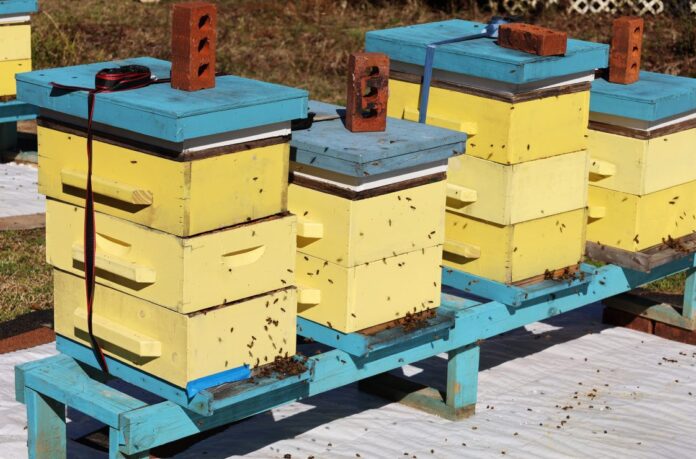AUBURN UNIVERSITY, Ala. — The Apiary Protection Unit of the Alabama Department of Agriculture and Industries (ADAI) confirmed the presence of Africanized honeybees (AHBs) in beehives in Jackson and St. Clair counties through genetic testing.
Officials at ADAI are developing a strategic monitoring plan for AHBs. Swarm traps will be placed within a five- to 10-mile radius of the confirmed cases. Bees from nearby beekeepers will also be sampled as a precaution. ADAI said this proactive measure aims to assess the extent of AHB infiltration and prevent future spread.
Monitoring hives in Alabama
Jack Rowe, an Alabama Cooperative Extension System bee specialist, said Alabama hasn’t had an AHB presence before, which keeps the state’s beekeepers from having colony management problems.
“The Apiary Protection Unit maintains a careful watch on the Port of Mobile to prevent an AHB invasion,” Rowe said. “It is up to the rest of us to ensure that we don’t bring AHBs in by accident. Vigilance is important, as is compliance with Alabama’s apiary laws.”
AHBs look like European Honeybees, but their behaviors are different. AHBs are more defensive, more easily disturbed and respond in greater numbers. Other identifying qualities are outlined in the press release from the ADAI (https://agi.alabama.gov/plantprotection/2024/06/africanized-honeybees-detected-in-alabama).
Apiculturists who regularly collect swarms or conduct bee removals should be alert for bees that seem highly aggressive to humans or animals. If encountered, Phillip Carter, an apiary inspector with the plant protection division of ADAI, encourages apiculturists to contact the plant protection division so a sample can be collected and tested for AHB genes.
“Investigators are speculating the two confirmed AHB colonies are a result of purchasing queens, packages and illegal nucs from other states with the presence of AHBs,” Carter said.
Follow laws to protect Alabama’s bee population
Rowe said Carter is asking all beekeepers to obey the No Comb Law by not purchasing nucs from out of state.
“We have this law in place to prevent exactly what is now happening, not just honeybee pests and diseases,” Carter said.
When purchasing mated queens or packages from another state with a confirmed presence of AHBs, it is imperative that the buyer request the seller’s certificate, confirming their testing for AHBs through their state’s apiary program.
“We must all comply with Alabama’s apiary laws to protect the bee population in Alabama and prevent the spread of AHBs in our state,” Rowe said.
Extension recommendations
Rowe said if beekeepers are receiving packages or queens from the following states, it is best to request certificates stating that the bee stock that they were raised from are free from AHB genes:
- Florida
- Louisiana
- Arkansas
- Texas
- New Mexico
- Arizona
- Nevada
- California
More information
If you think you’ve encountered an unusually aggressive hive, contact Rowe or Allyson Shabel, both members of Alabama Extension’s beekeeping team. Also reach out to the Apiary Protection Unit through the following contact information:
Central and north Alabama beekeepers, contact Jason James at 334-850-7757. South central and south Alabama beekeepers, contact Phillip Carter at 334-414-1666 or Randy Hamann at 334-850-7758. You may also contact Daniele Sisk in the ADAI Montgomery office at 334-240-7228.





















